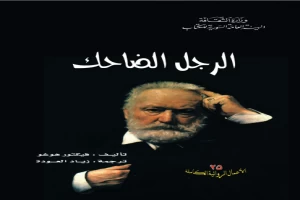Newly released
This book is new and will be uploaded as soon as it becomes available to us and if we secure the necessary publishing rights.

الرجل الضاحك Book PDF
(0)
Author:
Victor HugoNumber Of Reads:
98
Language:
Arabic
Category:
literatureSection:
Pages:
947
Quality:
good
Views:
1338
Quate
Review
Save
Share
Book Description
Victor Hugo
Victor Hugo was a renowned French author, poet, and dramatist of the 19th century, widely regarded as one of the greatest literary figures in French history. Born on February 26, 1802, in Besançon, France, Hugo began his literary career as a poet, publishing his first collection of poetry at the age of 20.
Hugo's childhood was marked by personal tragedy, including the death of his father when he was just 11 years old, and the deaths of his daughter and two of his sons later in life. These experiences are thought to have influenced his work, which often explores themes of loss, love, and human suffering. His writing was also heavily influenced by the political and social upheavals of his time, including the French Revolution and the rise of Napoleon Bonaparte.
Hugo was a prolific writer who produced a wide range of literary works throughout his career, including plays, essays, and political speeches. However, his most famous works are his novels, which often feature complex plots and a large cast of characters. "Les Misérables," for example, follows the story of ex-convict Jean Valjean as he struggles to rebuild his life in the midst of poverty and social injustice. The novel explores themes of love, redemption, and social inequality, and has been praised for its vivid descriptions of 19th-century France and its unforgettable characters.
In addition to his literary work, Hugo was also involved in politics, advocating for social justice and democratic reform throughout his career. He was a member of the French parliament for many years, and was a vocal opponent of the death penalty and other forms of injustice. He was also a leading figure in the Romantic movement, which emphasized emotion and individualism in art and literature.
Hugo's moral and political choices during the second half of his life and his unique actions made him an emblematic figure who was posthumously honored by the French Third Republic on May 22, 1885, with a popular funeral that accompanied the transfer of his body to the Cemetery in Paris on May 31, 1885.
Today, Hugo's works continue to be celebrated around the world for their depth, beauty, and enduring relevance. His novels have been translated into numerous languages, and his poetry is still widely read and admired. Hugo's legacy as one of France's greatest literary figures is secure, and his influence on French literature and culture can still be felt today.
Book Currently Unavailable
This book is currently unavailable for publication. We obtained it under a Creative Commons license, but the author or publisher has not granted permission to publish it.
Rate Now
5 Stars
4 Stars
3 Stars
2 Stars
1 Stars
الرجل الضاحك Quotes
Top Rated
Latest
Quate
Be the first to leave a quote and earn 10 points
instead of 3
Comments
Be the first to leave a comment and earn 5 points
instead of 3